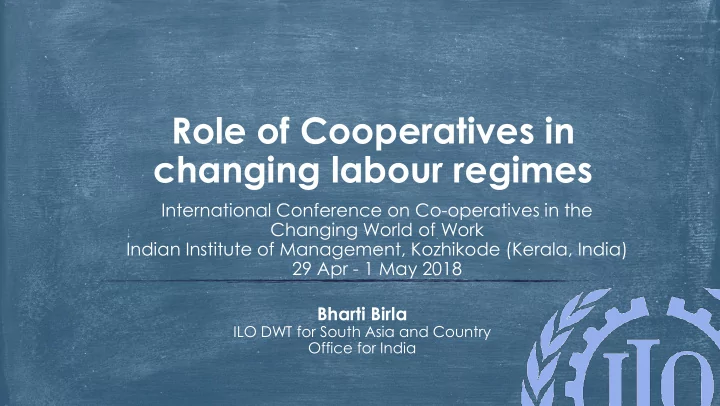

Role of Cooperatives in changing labour regimes International Conference on Co-operatives in the Changing World of Work Indian Institute of Management, Kozhikode (Kerala, India) 29 Apr - 1 May 2018 Bharti Birla ILO DWT for South Asia and Country Office for India
Overview Introduction Challenges Some examples
Introduction Socio economic transformations and changing labour regimes Changing nature of work and employment relationships Agrarian crises, climate change, rapid development, extractive industries, conflicts Rapid urbanization, pressure on cities, declining spending on social security Enhanced contractulization, increasing intermediaries, lower quality of jobs
What is this resulting into: Distress migration, often labour trafficking and forced labour Growing intermediation of jobs by range of actors, landing of workers in coercive jobs Stratification of worker class and wage depression Excluded and marginalized further excluded – indigenous, tribals, SC/STs, women, young population – adolescents and children Low paid precarious employment with practical exclusion from labour law and labour rights including freedom of association
Mobility by Choice Fair Recruitment Dignity and Decent Work How Cooperatives Help? Examples from ILO’s Work in Freedom Programme Bi-regional programme in South Asia and Middle East
Mobility by choice Organize the excluded and marginalized, enabling options Offer livelihood options Empowerment and collectivization Enhancing the value of work (especially women’s work) and formalizing it URMILA NAYAK: MOVE TOWARDS SELF- RELI LIANCE Community mobilization and leadership in local matters Urm Urmil ila had had ne never se seen a a mush ushroom, , less s al alone eaten one ea one. Bu But tod oday she she is s a a mush ushroom cult cultivator and and is s explo loring mar arkets in n nea nearby city city for or sell selling mush ushroom to o ear arn ext xtra prof profit. .
Reaching the unreached: Women and men from excluded communities Local livelihood options : Cooperatives/ collectives/ strengthening existing SHGs – Paper bag making, Leaf plate making, organic agriculture, agarbathi making, milk society (WiF Partner- SEWA) Haat Bazar, medicinal plants, poultry, mushroom (WiF Partner – Samarthan) Links to Skills and Employment: Info and link, employment exchange/job melas, pre decision information, network building A BAZAAR OF HO HOPE AND COURAGE: LOCAL WOMEN TAKE CH CHARGE Social Protection : Link to govt. schemes including MGNREGS etc. SHG grou SH group wom omen bi bid d for or loc ocal haa haat baz bazar mana anagement. . Participation in local governance: Community audits along with govt, to strengthen access for excluded communities (WiF partner – CINI)
Fair Recruitment into Decent Work Recruitment intermediaries Employer Job Seekers Big National and multinational companies • Heterogeneous Individual • Vulnerable workers • Job quality agents & Kinship • Migrants • Employment relations sub- networks Labour • Women agents. Interme • Children of working age diaries Heterogeneous Big and small actors with limited Small influence Skilling and No control over job quality service medium Interface with the employers providers firms
SKIL SKILLED WOMEN COLLECT CTIVES AND D SECTOR SK SE SKILL COUNCILS AND D COOPERATIVES VOCATIONAL TRAINING PR PROVID IDERS Mak aking the conn onnect SEWA and SE and NDWM (JG (JGKU) ) – Ran anchi, , Bui Build lding capa apacities on on fair air rec recruitment De Delh lhi, Patn tna, , Kerala into dec decent work ork Transparency and accountability in recruitment and placement Wage negotiations and COLLECT CTIVE OF OF RE RETURNEE AND D bargaining LOC OCAL WORKERS Alternate to chain of Sam Samarthan – Jash Jashpur/Sarguja unscrupulous agents
Mathadi Model: Head loaders tri-partite boards Design of the Act: Financially sustainable without subsidies Mandatory Registration and Routing of Wage Payments through the Board- Board de facto employer of the workers, wage fixation and regulation of employment Serving as Employment Exchange - Several advantages, fair recruitment, reducing commissions by agents Comprehensive Implementation structure - Executive Powers by Labour Department, Tripartite Boards and Advisory Committee, Autonomous character of boards, Organized urban markets where act is implemented - Economic activities concentrated in fairly well regulated Acts, employers are also organized.
Potential role such models can play/are playing Labour rights, social protection, freedom Formalizing the informal economy of association Reduction of poverty/distress migration Role of labour market intermediary Revitalization of low-income communities, Enhancing employment relationships Empowerment of low-income families and Grievance redressal and dispute individuals in rural and urban areas to resolution become fully self-sufficient Skill enhancement, use of drudgery reduction practices and innovations Organizing and collectivizing workers and giving them a voice
Role as labour market intermediary: move towards fair recruitment into decent work Providing labour, personnel and human resource Trying to change services - employer enabling labour demand for Working to rights, enabling labour in ways improve the access to justice that reduce ability of supply- -grievance and Working to inefficiencies side workforce dispute improve the and inequalities development resolution, social efficiency of the in wages, institutions to security, welfare job matching benefits, job meet employer process security, and needs (accepting the advancement; (accepting labour market as employer given); demand);
Potential role for better employment relationships Recognition that the employment relationship serves multiple purposes, in addition to the provision of social protection. Tackling the challenge of disguised employment relationships and dependent self- employment by defining a transparent employment relationship Source: ILO 2016, Adapted from Rubery, 2015.
Thank You Bharti Birla ILO DWT for South Asia and Country Office for India birla@ilo.org
Recommend
More recommend